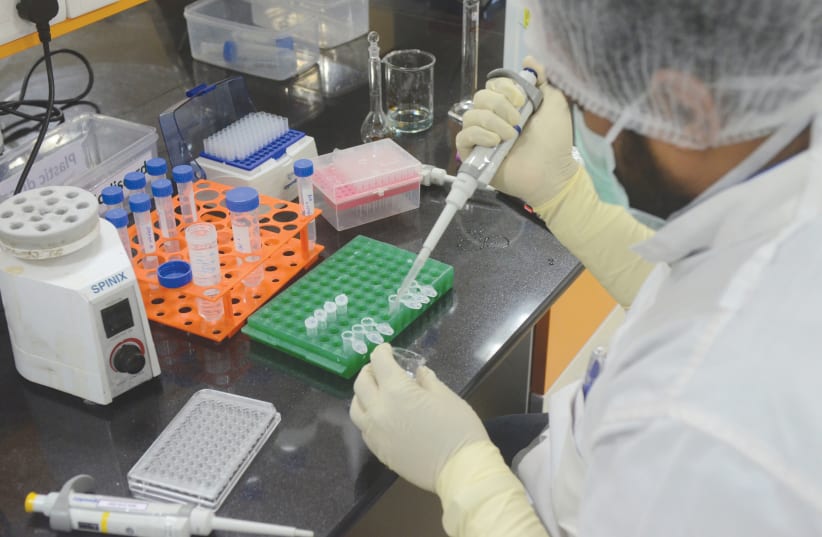As thousands of Israelis rush back to their health funds in search of a third COVID-19 vaccine shot and a Green Pass from isolation after traveling abroad, others are asking if another injection of messenger RNA is safe.
The American Food and Drug Administration provided full approval of the Pfizer coronavirus vaccine last week, but noted in its press release that “information is not yet available about potential long-term health outcomes.”
However, Tal Brosh, head of the Infectious Disease Unit at Samson Assuta Ashdod University Hospital, told The Jerusalem Post that while he cannot claim to know what is going to happen in 10 years, “there is no true reason to think there are any significant long-term effects” of the vaccine.
He explained that there is no other vaccine that was evaluated for a decade before approval and that there is not an example of another vaccine – although no other vaccine is an mRNA vaccine – that has been linked to any significant long-term effects.
“There is no evidence of something happening unless it happened in the first two hours, two weeks or two months,” said Michal Linial, a professor of biological chemistry at the Hebrew University of Jerusalem. “We do not know of any other examples in which the immune system decided to suddenly react to a vaccine that was given 15 years prior.”
THERE ARE also few examples of people being nervous about taking a booster shot of an already approved vaccine.
If a person were to get cut by rusted metal and go to a doctor, the health professional would probably tell that individual to get a tetanus booster shot. It is unlikely this person would ask the doctor if the booster was safe or if it could prevent her from getting pregnant or him from making babies.
“This is the same thing,” Linial said. “I can understand in the beginning that this was a breakthrough and people were shocked, like it is some kind of satellite to the Moon and they don’t want to be the first on the satellite. But now we know: This is nothing like that.”
Rather, more than two billion people worldwide have been inoculated against COVID-19 with more than five billion doses. Around 210 million Pfizer mRNA doses have been distributed in America, for example. In Israel, more than 8.5 million doses have been administered.
While traditional vaccines generally put a weakened or inactivated germ into our bodies, according to the Centers for Disease Control and Prevention, mRNA vaccines “teach our cells how to make a protein – or even just a piece of a protein – that triggers an immune response inside our bodies. That immune response, which produces antibodies, is what protects us from getting infected if the real virus enters our bodies.”
Brosh said that this does not mean that the vaccine changes people’s genetic code. Rather, he said the mRNA is more like a USB device that is inserted into a computer: It does not impact the hard drive of the computer but runs a certain program.
“Messenger RNA is a very fragile molecule, meaning it can be destroyed very easily,” Linial explained. “If you put mRNA on the table, for example, in a minute there will not be any mRNA left. This is as opposed to DNA, which is as stable as you get.”
She said that this fragility is true of the mRNA of any living thing, whether it belongs to a plant, bacteria, virus or human.
WHILE THE Moderna and Pfizer vaccines are based on new technologies, they are asking our bodies to do something they do every day: cells synthesizing protein.
Moderna and Pfizer are simply delivering a specific mRNA sequence to our cells. Once the mRNA is in the cell, human biology takes over. Ribosomes read the code and build the protein, and the cells express the protein in the body.
This is one of the main reasons to believe there will be no long-term consequences to the vaccine, said Prof. Eyal Leshem, director of Sheba Medical Center’s Center for Travel Medicine and Tropical Diseases.
While the Pfizer and Moderna vaccines are the first mRNA ones to ever be brought to market for human patients, Linial said she believes the reason that no mRNA vaccine has been developed until now is because there was just no need to move this fast on a vaccine until COVID-19 came along.
In fact, scientists have been experimenting with mRNA for the better part of the last three decades. Leshem said mRNA vaccines for other diseases, including cancer, have been tested in humans for around 10 years and “no long-term effects were registered” in those trials – though he admitted that these trials generally included small numbers of participants.
Individuals began receiving mRNA vaccines against COVID-19 as early as July of last year, and adverse effects have been closely tracked worldwide since then.
In Israel, the first vaccines were administered on December 20, 2020.
“There is more data on the adverse events of these vaccines than we have ever had on any other vaccine,” Brosh said, adding that no vaccine has ever been given to so many people so quickly.
Most adverse events were simple “reactogenicity” – reactions that occur soon after vaccination and that are a physical manifestation of the inflammatory response. These can include fever, muscle pain, swelling at the site of injection or swelling of the lymph nodes, for example – all symptoms that can generally be treated with paracetamol or the like.
THE VACCINE was linked to one “immune-mediated phenomenon,” said Brosh, and that is myocarditis – inflammation of the heart muscle – which was the predominant serious side effect in young male adults between the ages of 16 and 25. But even then, myocarditis was rare, generally mild, and those people who developed it fully recovered, he said.
Moreover, unvaccinated people who contracted COVID-19 were four times more likely to develop myocarditis than vaccinated people were, according to a new study by Clalit Health Services together with Harvard University that was published last week in the New England Journal of Medicine.
The study found that there were around 2.7 cases of myocarditis per 100,000 vaccinated people infected with the virus, compared with 11 cases per 100,000 unvaccinated people who were infected.
In general, the study showed that individuals who take the Pfizer coronavirus vaccine may suffer from four out of up to 25 clinically relevant side effects: myocarditis, swelling of the lymph nodes, appendicitis and herpes zoster.
In contrast, high rates of multiple serious adverse events were associated with coronavirus infection among unvaccinated patients, including a greatly increased risk of developing myocarditis, pericarditis, arrhythmias, heart attacks, strokes, pulmonary embolism, deep-vein thrombosis or acute kidney damage.
“So, all together we know the vaccines are safe and effective. This holds true for the initial doses and probably also for the booster doses,” Leshem said.
Linial said she believes that most future vaccines will be made of mRNA because “it is an easy, great technology – no question.”
She also said that vaccination is the only way to beat this pandemic.
“If people want to go back to their lives,” Linial said, “the population must be vaccinated.”

